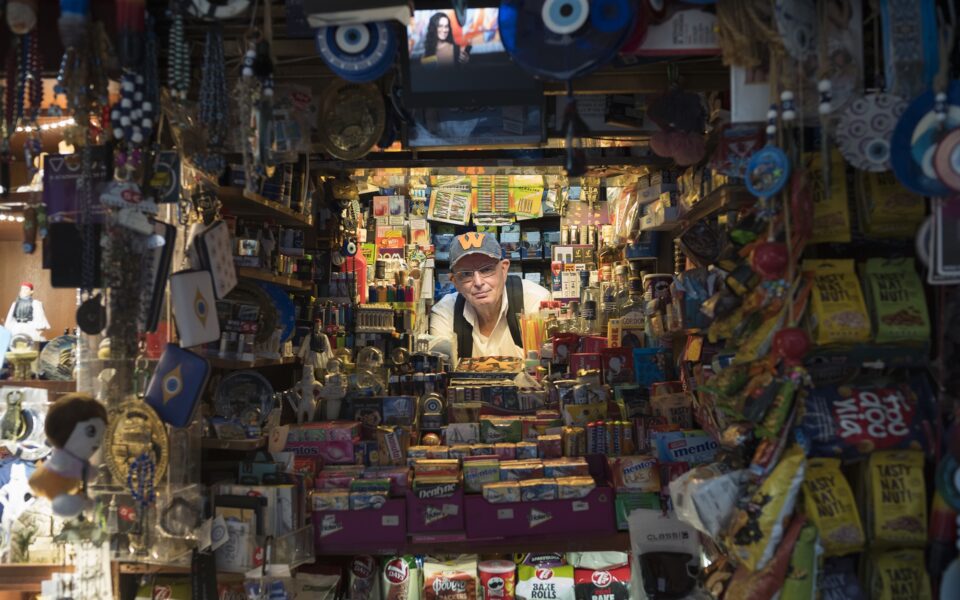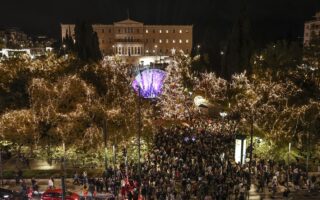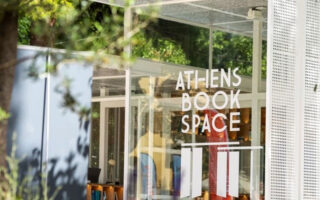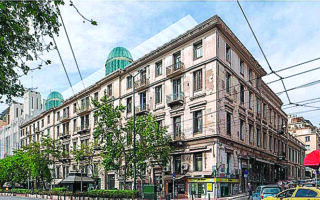Swiss filmmaker documents the rise and fall of the iconic Greek kiosk

While browsing the special screenings program of this year’s Athens International Film Festival (AIFF), I stumbled upon “Periptero: je t’aime moi non plus,” a documentary by Pier Blattner. What could have left such an impression on a Swiss filmmaker that convinced him to make a documentary about Greek kiosks?
I embarked on a quest to find him, and I tracked him down in Athens. We met, and he expressed his eagerness to present this documentary to the Greek audience for the first time, a project that had taken him a whole decade to complete. Between 2011 and 2021, Blattner, a permanent resident of Geneva, traversed Greece with a camera in hand, engaging in conversations with kiosk owners, local officials, and everyday citizens, encapsulating in a concise 40-minute narrative the political, social and cultural dimensions of a phenomenon that has indelibly marked Greece’s history for over 120 years.
“I conceived the idea for the documentary in 2002, during my first visit to Athens as a tourist,” he shares. “The initial thing that immediately captured my attention was these diminutive mini-stores lining the sidewalks, boasting their unique architectural charm. There’s truly nothing quite like them anywhere else in the world! I conducted extensive research, delving into their operations, observing their interactions with people, and delving into their origins. I found it intriguing to capture this modest yet profoundly significant journey through time on film.
“As I delved further into their history, tracing their evolution and endurance, not just in urban settings but also in the Greek provinces, I was truly awed when I realized that these small stores had managed to endure virtually unchanged in the modern environment for a century. To me, they symbolized resilience over time, marked by exceptional adaptability, and stood as a symbol deeply intertwined with the history of the modern Greek state.”
As our conversation unfolds, I become increasingly aware of his exceptional depth of knowledge, and it becomes evident that he didn’t approach the tourism aspect merely as folklore. “The origins of the kiosks can be traced back to the small tobacco shops that emerged in the late 19th century following the country’s liberation,” he explains. “The inaugural kiosk in Athens made its debut in 1911 on Panepistimiou Street. Initially, they exclusively offered tobacco products, but subsequently expanded their offerings to include newspapers, followed by sweets and soft drinks, ultimately evolving into the minimarkets we see today. By the 1950s, telephones had also been installed, rendering them immensely popular among the public.
“I believe the documentary holds value even for the Greek population itself, shedding light on aspects they might not be acquainted with regarding this inherently Greek phenomenon. For instance, it reveals that from their inception and for numerous years, kiosks served as a form of state recognition for those who had been wounded in service to their country during wartime. In the last decade, the government’s decision to liberalize licenses has brought about significant changes in their dynamics.”
Underground Greece
Beyond the brief historical overview, Blattner’s documentary primarily delves into how the economic crisis of the past decade impacted kiosks, providing insight into Greece during the era of austerity, international bailouts, and immigration. “I journeyed to various places, from Athens and Thessaloniki to Grevena, Lamia, as well as the islands of Patmos and Leros. It became evident that the challenges faced by kiosk owners, in a way, mirrored the struggles of the majority of Greeks starting from 2011. Foreign viewers of the documentary have been captivated by this more obscure aspect of Greece they encounter. For 10 years, I roamed your country without truly residing in Greece, yet through the narratives of kiosk owners, I managed to comprehend not only your hardships but also your knack for innovation, adaptability, and, above all, your ability to embrace life.
“I constantly recall a poster hanging on the wall of a cafe on Athinaidos Street that reads, ‘The only thing we have is now.’”
Completing the documentary was no mean feat for him. Many kiosk owners hesitated to appear on camera, and securing funding remained a challenge. “Funding for the project came from NZNTV, the Swiss production company I established and chair, and I could depend on the support of numerous individuals, particularly [curator] Katerina Koskina, the Polites nonprofit organization, and the Municipality of Athens. They all believed in my project because such a comprehensive exploration of kiosks had never been undertaken before. I believe that Greeks simultaneously harbor both affection and frustration toward kiosks. The older generations contend that they occupy too much space on the sidewalks, while the younger generations feel fortunate that they can step out of their homes at midnight and purchase a soft drink or a pack of cigarettes! In Geneva, my current place of residence, everything shuts down after 10 at night! These distinctive small shops infuse vitality into neighborhoods, and particularly in rural areas, they serve as a gathering spot for residents. Through my interactions with kiosk owners, I have grown to admire and appreciate the Greeks themselves, primarily for the emphasis they place on values such as friendship, love, curiosity, creativity, resilience, beauty and discovery.”





